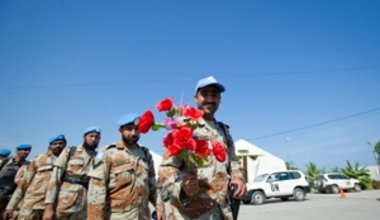Maliana, 21 February 2011 - Delfina Fatima has been running her bakery in Maliana for a year. But she says the $500 loan she received a few months ago from one of Timor-Leste's microfinance institutions, Tuba Rai Metin, has made a huge difference to her business.
"I'm now producing a lot more bread. I get through 3 sacks of flour per day and I'm making a good profit. I supply bread to people all over Maliana, including a daily batch of 450 bread rolls to the school."
Meeting Delfina Fatima, and hearing her story, was part of a field visit to Maliana organized by the INFUSE programme, which is jointly implemented by the United Nations Development Programme (UNDP) and the United Nations Capital Development Fund (UNCDF). INFUSE also receives support and funding from the Ministry of Economy and Development, and the Australian Agency for International Development (AusAID).
The INFUSE programme aims to build an inclusive financial sector, with the overall goal of increasing access to a range of financial services for the poor and low income population in Timor-Leste.
During the field visit to Maliana, representatives from the UN, the Government of Timor-Leste, the donor community and civil society, met clients of the country's two main microfinance institutions, Moris Rasik and Tuba Rai Metin. Both have a clientele of only women.
UNDP's Resident Representative, Finn Reske-Nielsen, says:
"This was a great opportunity to hear directly from the women who are benefitting from the microfinance services. The variety of enterprises from tofu production to motorbike taxis, and the determination of the clients to improve their businesses, is very impressive".
The delegation also attended one of Moris Rasik's centre meetings. This is where the clients make their weekly repayments, with the transactions recorded in deposit books and a Collection and Disbursement Sheet. The clients keep the books, and bring them back each week for the meeting.
"The women at this centre receive individual group loans", explained Moris Rasik's Managing Director, Lola dos Reis.
"Clients form solidarity groups, normally between 3 and 8 participants. These members support each other with the loan repayments. The majority of the members at this centre meeting are illiterate, so proceedings are read out. The women are taught how to do their signature, so that they are empowered in the transaction process".
Moris Rasik has around 12,400 clients and operates in all of Timor-Leste's 13 districts, serving poor, and predominantly rural, women.
"We're the ones that work and bring in the money. So it's us, not the men, who get to save and control the money", says Domingas Pereira. She received a loan to buy vegetables in bulk from farms, which she then resells from her kiosk and in the market.
For most women the loans help with the start up cost of a new enterprise. This lump sum enables them to buy the raw materials and gradually expand their business and increase their profits.
"It's important for everyone to have access to financial services", says Jeff Prime from AusAID.
"These microfinance institutions give women the chance to manage their money and their lives. The women we have met in Maliana are great examples of how access to initial capital can make a big difference".
Following the 2006 crisis in Timor-Leste, 4 microfinance organisations were wiped out. Even now there are only 3 such institutions in the country. But those that exist are growing rapidly; Tuba Rai Metin had 4 branch offices in December 2009 and 501 new clients. By December 2010 they had increased the number of branch offices to 11 and had 2687 new clients.
"These clients are Timor-Leste's future entrepreneurs. Loans and savings options help boost the income of poor households, and also encourage initiative and enterprise", says Craig Sugden, the Resident Representative of the Asian Development Bank.
Delfina Fatima's bakery is one example of a small enterprise that has grown into a strong and successful business. She says you need courage and support to take the first step. But success has given her confidence and financial security; in fact her biggest problem is keeping up with the high demand for her bread. She will use her next loan to buy a machine to pound the ingredients and expand her business even further.
For more information, please contact: Clare Santry, Media and Communications Officer, UNDP Timor-Leste at clare.santry@undp.org; Mobile: +670 7245425).
*******
 UN
UN United Nations Peacekeeping
United Nations Peacekeeping




